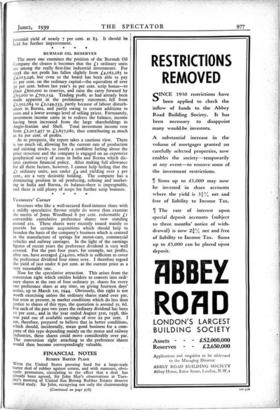BURMAH OIL RESERVES
The more one examines the position of the Burmah Oil Company the clearer it becomes that the £t ordinary units are among the really first-line industrial investments. For 1938 the net profit has fallen slightly from £4,162,285 to £4,015,246, but even so the board has been able to pay 21 per cent. on the ordinary capital—the equivalent of over 3o per cent. before last year's 5o per cent. scrip bonus—to place £600,00o to reserves, and raise the carry forward by £65,000 to £702,154. Trading profit, as had already been made apparent in the preliminary statement, fell from £2,502,284 to £2,149,533, partly because of labour disturb- ances in Burma, and partly owing to certain additions to costs and a lower average level of selling prices. Fortunately, investment income came in to redress the balance, income having been increased from the large shareholdings in Anglo-Iranian and Shell. Total investment income rose from £2,217,457 to £2,657,080, thus contributing as much as 62 per cent. of profits.
As to prospects, the report takes a cautious view. There is too much oil, allowing for the current rate of production and existing stocks, to justify a confident feeling about the price structure and the company is engaged on an expensive geophysical survey of areas in India and Burma which dic- tates cautious financial policy. After making full allowance for all these factors, however, I cannot help feeling that the LI ordinary units, just under £4 and yielding over 5 per cent., are a very desirable holding. The company has a dominating position in oil producing, refining and market- ing in India and Burma, its balance-sheet is impregnable, and there is still plenty of scope for further scrip bonuses.
* * * *










































 Previous page
Previous page